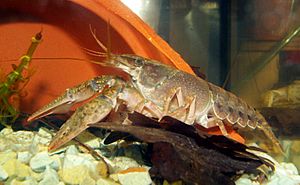Faxonius immunis facts for kids
Quick facts for kids Faxonius immunis |
|
|---|---|
 |
|
| Conservation status | |
| Scientific classification |
|
| Kingdom: | Animalia |
| Phylum: | Arthropoda |
| Subphylum: | Crustacea |
| Class: | Malacostraca |
| Order: | Decapoda |
| Family: | Cambaridae |
| Genus: | Faxonius |
| Species: |
F. immunis
|
| Binomial name | |
| Faxonius immunis (Hagen, 1870)
|
|
| Script error: The function "autoWithCaption" does not exist. | |
| Synonyms | |
|
|
Script error: No such module "Check for conflicting parameters".
The Faxonius immunis is a type of crayfish often called the calico crayfish or papershell crayfish. It's a small, freshwater creature that looks a bit like a mini lobster. These crayfish are naturally found across a large part of North America. However, they have also been introduced to Europe, especially along the Rhine River, where they are now considered an invasive species.
Contents
About the Calico Crayfish
What is a Crayfish?
Crayfish are crustaceans, just like crabs and shrimp. They live in fresh water, like streams, ponds, and marshes. They are important parts of their ecosystems, eating small plants and animals and also being food for larger animals.
How Scientists Name Them
Scientists give every living thing a unique name, like Faxonius immunis. This helps everyone know exactly which creature they are talking about. This particular crayfish was first described by a scientist named Hermann August Hagen in 1870. He first called it Cambarus immunis.
What Does It Look Like?
The calico crayfish looks similar to other crayfish in its group, called Faxonius. It can be tricky to tell them apart sometimes. One way to identify the calico crayfish is by looking closely at its claws. It has a small notch, or dip, near the base of the "finger" part of its claw. This notch is not found on a similar crayfish called F. virilis.
Where the Calico Crayfish Lives
In North America
The calico crayfish is native to a huge area in eastern North America. You can find it from Maine and Connecticut in the east, all the way to Colorado and Wyoming in the west. It also lives from Alabama in the south up to Manitoba, Ontario, and Quebec in Canada. Some populations in Canada, especially in Quebec, might have been introduced by people who were fishing. It is also thought that people introduced them to several states in New England, like Massachusetts and Vermont.
In Europe
The calico crayfish became popular as a pet in Germany, especially for aquariums and garden ponds. Sometimes, pets escape into the wild. The first time a calico crayfish was found in the wild in Europe was in 1997, in a small canal in Baden-Württemberg, Germany.
Since then, a group of these crayfish started living and reproducing in the wild. They have spread along the Rhine River and are now found in places like Karlsruhe and Speyer. They have also been seen in other parts of Europe, including Rhineland-Palatinate in Germany and in France. Scientists have noticed that the calico crayfish seems to be doing better than another invasive species of crayfish, F. limosus, which has been in the area for about 50 years. This means the calico crayfish is very good at adapting to new places.
Its Favorite Home
The calico crayfish prefers to live in water that moves slowly. This includes places like small streams, ponds, marshes, and even ditches along roads. Unlike some other crayfish, it doesn't like fast-flowing rivers.
One amazing thing about the calico crayfish is its ability to survive when its watery home dries up. If the water level drops, it can burrow deep into the ground. This helps it stay safe and moist until the water returns.
 | Shirley Ann Jackson |
 | Garett Morgan |
 | J. Ernest Wilkins Jr. |
 | Elijah McCoy |


